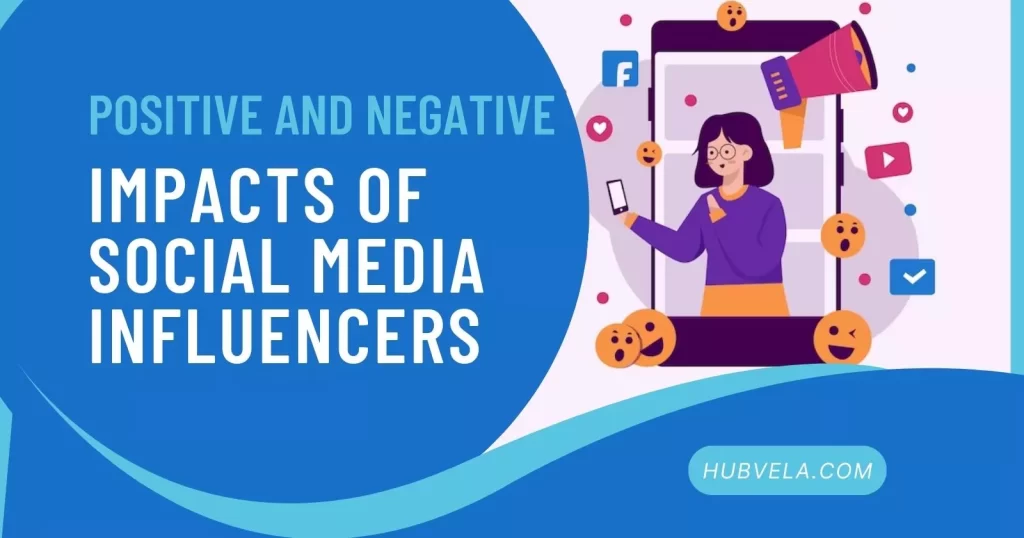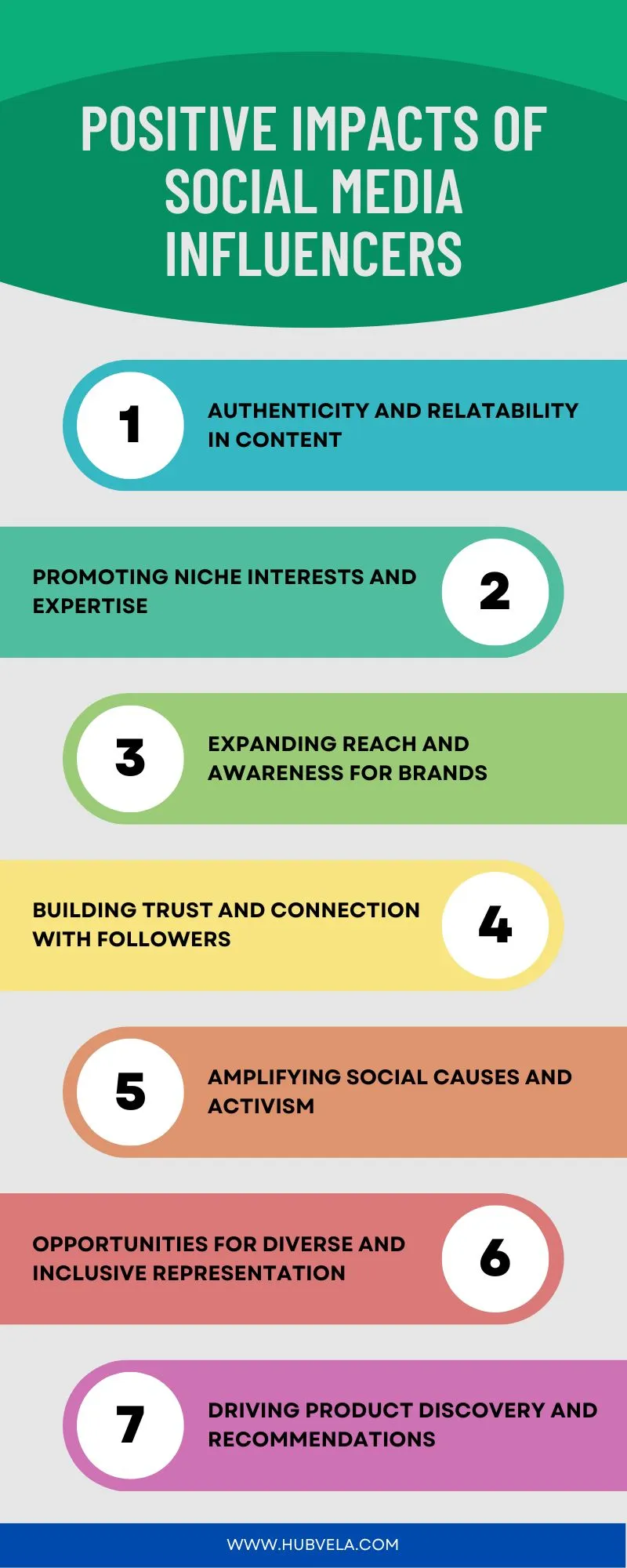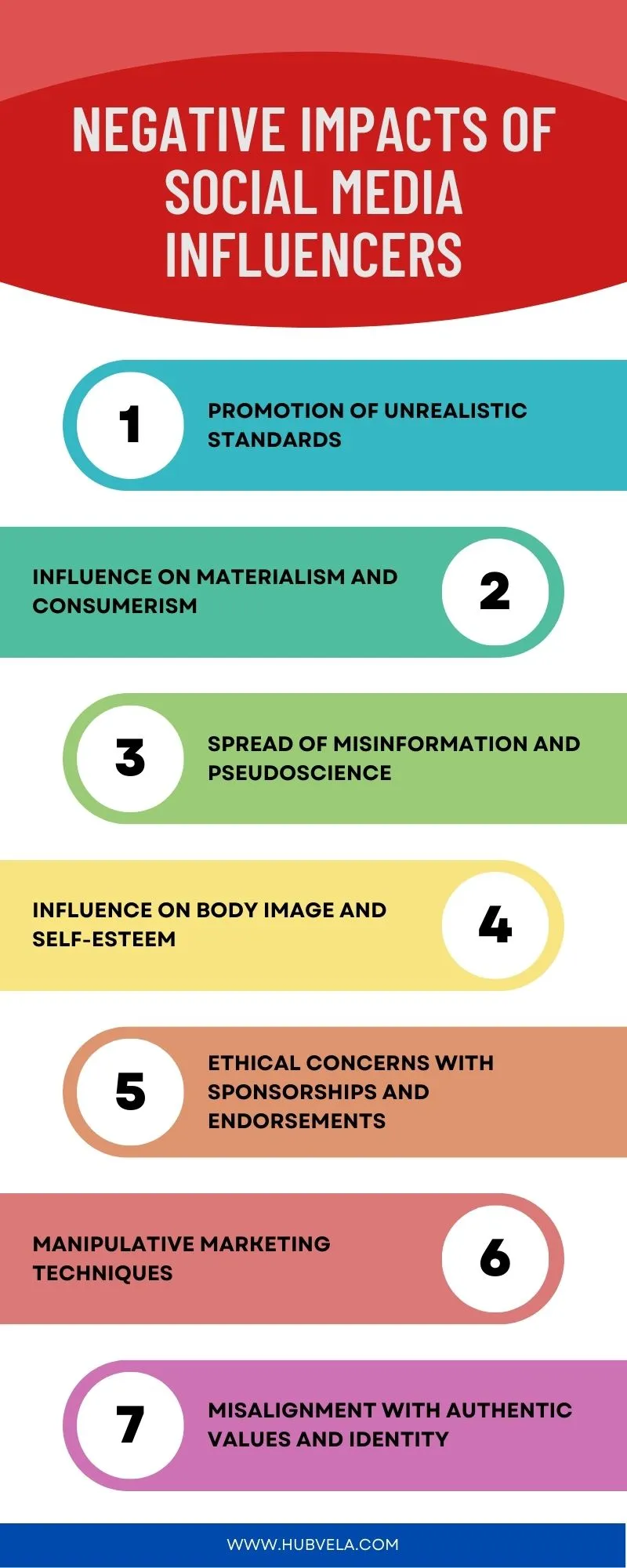Social media has revolutionized the way we connect and interact with each other, and it has given rise to a new phenomenon: social media influencers.
Influencers are individuals who have amassed a large following on social media platforms such as Instagram, TikTok, and YouTube and are able to influence their followers’ opinions and behaviors.
While influencers can have a positive impact, there is growing concern about their effect on young minds.
This article will explore the positive and negative impacts of social media influencers, including their impact on mental health, overconsumption, raising awareness, and more.

--Advertisement--
Positive Effects of Social Media Influencers
Social media influencers have become a new marketing channel, with many businesses turning to them to promote their products and services to a large audience.
Influencer marketing has become popular due to the ability of influencers to reach a large audience and promote products or services in a way that is relatable and trustworthy. We will explore the positive effects of social media influencers in more detail.

1. Authenticity and Relatability in Content
Authenticity and relatability are important factors in influencer marketing, as they allow influencers to connect with their audience on a deeper level.
Authenticity fosters a sense of loyalty and trust between influencers and their followers, which can lead to higher engagement levels and increased brand loyalty.
When influencers share their personal experiences, challenges, and triumphs, their audience feels a sense of authenticity and relatability, which creates a genuine bond between them.
This bond is based on trust, transparency, and the influencer’s ability to be true to themselves and their values.
Authenticity shines through when influencers have the creative freedom to share their personal experiences, insights, and perspectives, which allows them to connect with their audience on a more emotional and relatable level.
However, it is important to note that the authenticity of influencers can be questioned, as they may promote products only to get them for free or in exchange for money.
Therefore, influencers should continue creating organic content that is not tied to brand partnerships to maintain a sense of authenticity and ensure that their content remains diverse.
2. Promoting Niche Interests and Expertise
Promoting niche interests and expertise is a positive effect of social media influencers. Niche influencers are social media users who have a tight-knit community around a specific topic or interest.
They specialize in a particular niche, such as beauty, fashion, fitness, or travel, and create engaging content related to their area of expertise. By partnering with niche influencers, brands can tap into their target audience easily and effectively.
These influencers have a smaller following compared to celebrities or mega-influencers, but their audience is highly engaged and passionate about the same topic.
Their niche following allows them to provide more authentic and specialized content, which resonates with their audience and carries more weight.
By collaborating with niche influencers, brands can reach a specific group of consumers who are interested in their niche, promoting their products or services to a highly targeted audience.
This helps to build brand awareness, improve brand credibility, and establish trust among the audience. Additionally, partnering with niche influencers enriches a brand’s content strategy by providing valuable and relevant content that aligns with the brand’s niche.
Promoting niche interests and expertise through social media influencers allows brands to connect with a highly targeted audience and establish themselves as authorities in their respective niches.
3. Expanding Reach and Awareness for Brands
Social media influencers have become a powerful tool for brands to expand their reach and increase awareness.
By partnering with influencers who have a large and engaged following, brands can tap into their influence and leverage their credibility to promote their products or services.
Influencers have the ability to create authentic and relatable content that resonates with their audience, making it more likely for their followers to trust and engage with the brand. This can lead to increased brand visibility, reach, and ultimately, sales.
Additionally, influencers often have a niche or specific target audience, allowing brands to reach a more targeted and relevant group of consumers.
By harnessing the power of social media influencers, brands can effectively expand their reach and raise awareness among their target market.
4. Building Trust and Connection with Followers
Social media influencers have the ability to build trust and connection with their followers by sharing relatable stories, personal experiences, and honest opinions.
By doing so, influencers create a sense of authenticity that resonates with their audience, making them more trustworthy and credible.
Influencers also foster a sense of community and personal relationships with their followers, which can lead to increased engagement and loyalty.
This connection is built on the influencer’s ability to fulfill the needs of their followers by providing them with valuable content, advice, and recommendations.
Additionally, influencers who share their real feelings and emotions with their followers can act as real friends, which can lead to a deeper sense of connection and trust.
Social media influencers have the potential to build strong relationships with their followers, which can lead to positive outcomes for both the influencer and their audience.
5. Amplifying Social Causes and Activism
Social media has revolutionized the way we think about, connect to, and engage with social justice and activism. Social media influencers can play a significant role in amplifying social causes and activism by using their platforms to raise awareness and promote inclusivity.
By partnering with a social media influencer who has enough followers to influence public opinion, a message can be greatly boosted.
Social media activism is sometimes criticized as being more talk than action, but many posts are centered around driving a real-world difference.
Actionable posts compel audiences to do something, like sign a petition, contact a representative, give a donation, or show up to a protest.
Therefore, social media activism can have a significant impact on relationships with customers and can be an effective tool for organizing and promoting social causes and activism.
6. Opportunities for Diverse and Inclusive Representation
Social media influencers have opened up new opportunities for diverse and inclusive representation. In the past, traditional media platforms often lacked diversity and failed to adequately represent marginalized communities.
However, social media has provided a platform for individuals from all backgrounds to share their stories, experiences, and perspectives.
Influencers from various ethnicities, genders, and sexual orientations have been able to build large followings and use their platforms to amplify underrepresented voices.
This has not only allowed for greater representation but has also fostered a sense of community and empowerment among marginalized groups.
By showcasing diverse perspectives and experiences, social media influencers are helping to break down barriers and promote inclusivity in the digital space.
7. Driving Product Discovery and Recommendations
Social media influencers can play a significant role in driving product discovery and recommendations. According to a recent study, 22% of consumers prefer to discover new products via social media.
Social media platforms such as Instagram, TikTok, and Pinterest offer in-app product discovery and checkout tools for brands and creators, allowing buyers to research products promoted by people they trust on the social platforms they frequent, without the hassle of navigating to a new website.
By investing in the right influential partner and aligned social channels, brands can grow their organic online reach, improving the customer experience, creating new opportunities for continued influencer partnerships, and fueling more online sales.
Working with influencers can significantly improve product discovery and boost conversion rates.
Moreover, using AI to offer personalized recommendations to users based on their browsing and purchasing history and the browsing and purchasing history of similar profiles can help show similar products to the ones the user is interested in, accessories to ‘shop the look,’ and ‘you may also like’ suggestions.
Negative Effects of Social Media Influencers
Social media influencers have become a ubiquitous presence on platforms such as Instagram, TikTok, and YouTube. These individuals have amassed large followings and are able to influence their followers’ opinions and behaviors.
While influencers can have a positive impact, there is growing concern about their effect on individuals, particularly young people. We will explore the negative effects of social media influencers.

1. Promotion of Unrealistic Standards
Social media influencers often promote unrealistic beauty standards, leading to negative effects on body image and self-esteem.
Exposure to idealized beauty standards on social media can lead to feelings of inadequacy and low self-esteem, as well as perpetuate unrealistic beauty standards that are unattainable for most people.
According to a study, 88% of teenage girls believe in the unrealistic beauty standards promoted by the media. This can lead to negative body image, disordered eating, and even depression and anxiety.
It is important to recognize that the images and ideals presented on social media are often unrealistic and unattainable and that everyone is unique and beautiful in their own way.
To reduce harm on social media, it is recommended to unfollow accounts that promote unrealistic beauty standards, find a healthy community, and take breaks.
2. Influence on Materialism and Consumerism
The rise of social media influencers has had a significant impact on materialism and consumerism. Influencers often promote products and services to their followers, and many of these products are luxury items or things that people may not necessarily need.
This can create a culture of materialism, where people feel pressure to buy things they don’t need in order to keep up with the latest trends.
Additionally, influencers often receive compensation for promoting products, which can lead to a lack of transparency and authenticity.
This can make it difficult for consumers to know whether a product is genuinely good or if it’s just being promoted for financial gain.
As a result, the influence of social media influencers on materialism and consumerism is a complex issue that requires careful consideration.
3. Spread of Misinformation and Pseudoscience
The spread of misinformation and pseudoscience is a significant issue that arises due to the influence of social media influencers. Social media platforms provide a vast audience for influencers to share their opinions and beliefs, which can often be misleading or false.
Influencers with a large following can spread misinformation and pseudoscience to their followers, who may not have the necessary knowledge or resources to fact-check the information.
This can lead to the spread of false information and beliefs, which can have negative consequences on individuals and society as a whole.
The spread of misinformation and pseudoscience can cause confusion, mistrust, and fear among people, leading to poor decision-making and even harm.
Therefore, it is essential to be aware of the potential negative effects of social media influencers and to critically evaluate the information they share.
4. Influence on Body Image and Self-Esteem
Social media influencers can have a negative impact on their followers’ body image and self-esteem by promoting unrealistic beauty standards.
Many influencers present an idealized and unattainable image of beauty, often using filters and photo editing tools to enhance their appearance.
This can create unrealistic beauty standards, leading to body dissatisfaction and low self-esteem in both women and men.
In addition, influencers who promote unhealthy behaviors such as extreme dieting or cosmetic surgery can contribute to the development of eating disorders and other mental health issues.
While some “body positive” influencers argue that showing their imperfections can eliminate damaging and unattainable standards, many models and influencers continue to post perfected images of their bodies, still enforcing this impossible beauty standard on social media.
Social media influencers can have a negative impact on their followers’ body image and self-esteem by promoting unrealistic beauty standards and unhealthy behaviors.
5. Ethical Concerns with Sponsorships and Endorsements
Social media influencers often engage in sponsorships and endorsements, which can raise ethical concerns regarding transparency and authenticity.
While many influencers disclose their sponsorships and partnerships, some may not be transparent about their financial relationships with brands, leading to a lack of trust and credibility.
This lack of transparency can also lead to the promotion of products or services that may not align with the influencer’s values or beliefs, which can be misleading to their followers.
Additionally, some influencers may promote products or services that are harmful or unethical, such as weight loss supplements or cosmetic surgery procedures.
These endorsements can contribute to the perpetuation of unrealistic beauty standards and unhealthy behaviors, leading to negative outcomes for their followers.
It is important for influencers to be transparent and authentic in their sponsorships and endorsements to maintain the trust and credibility of their followers and avoid promoting harmful products or services.
6. Manipulative Marketing Techniques
Manipulative marketing techniques are a growing concern on social media, particularly in relation to influencer marketing.
The Australian Competition and Consumer Commission (ACCC) has launched a sweep to identify misleading testimonials and endorsements by social media influencers.
The ACCC has received over 150 tip-offs from consumers who responded to their Facebook posts asking for information.
Most of the tip-offs were about influencers in beauty and lifestyle, as well as parenting and fashion, failing to disclose their affiliation with the product or company they are promoting.
Manipulative marketing techniques can include inauthentic partnerships and content, as well as failing to disclose commercial motivations behind posts.
Brands should endeavor to inoculate against manipulative inferences by communicating values-driven motives when leveraging influencers’ support.
It is important for marketers to recognize the hard work that influencers do and not take advantage of it as best they can.
Allowing influencers to have creative licenses when it comes to crafting content can improve the quality of sponsored content and make their job easier.
7. Misalignment with Authentic Values and Identity
The influence of social media influencers can lead to a misalignment of authentic values and identity. Influencers often present an idealized image of their lives, promoting unrealistic expectations and narrow definitions of beauty.
This can create a dissonance between the influencer’s curated online persona and their true values and identity.
The pressure to conform to societal beauty standards and the need for validation from followers can lead influencers to compromise their authenticity and promote products or behaviors that may not align with their genuine beliefs.
This misalignment can be detrimental not only to the influencer’s sense of self but also to their followers who may be influenced by these inauthentic representations.
It is important for influencers to stay true to their values and maintain authenticity in order to foster genuine connections and a positive impact on their audience.
Conclusion on Positive and Negative Impacts of Social Media Influencers
In conclusion, the impact of social media influencers on young minds can be both positive and negative.
While influencers have the ability to inspire and educate young people, they can also promote unrealistic standards, unhealthy behaviors, and products that may harm their well-being.
On the positive side, influencers can serve as role models, motivating young people to pursue their passions, strive for success, and live healthy and fulfilling lives. They can also share relatable and authentic content that resonates with young people.
However, there is growing concern about the negative effects of social media influencers. Many young people spend excessive amounts of time on social media, comparing themselves to others and feeling inadequate.
Influencers can also promote unhealthy behaviors such as smoking, drinking, and even criminal activities.
It is important for individuals, especially young people, to be mindful of the influence of social media influencers and critically evaluate the content they consume.


